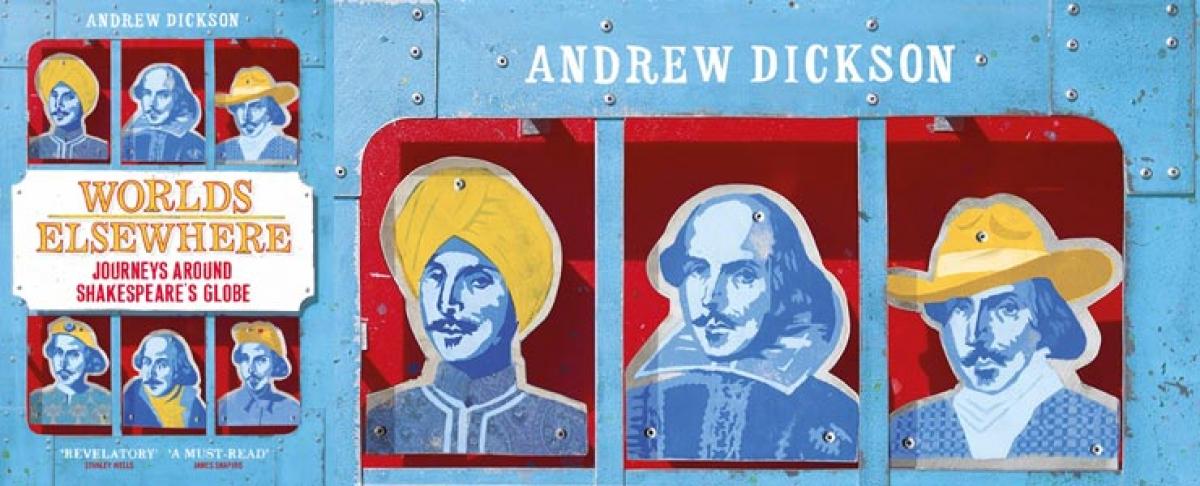Live
- GMR Airports Unveils AI-Powered Digital Twin Platform to Transform Airport Operations
- India poised to become leading maritime player: PM Modi
- Top Causes of Kidney Stones and How to Recognize Silent Symptoms
- India’s renewable energy capacity logs 14.2 pc growth at 213.7 GW
- Winter Session of Odisha Assembly adjourned sine die
- Biden calls Trump's tariff approach 'major mistake'
- After Drama Over Eknath Shinde’s Chief Minister Race, Maharashtra Cabinet Formation Faces New Tensions
- Egyptian FM, Blinken discuss recent developments in Syria
- Iran's supreme leader says Syria's developments result of US-Israeli 'plot'
- Elon Musk to Purchase $100 Million Luxury Mansion Next to Donald Trump's Mar-a-Lago, Report Reveals
Just In

Worlds Elsewhere - Journeys Around Shakespeare\'s Globe; Author: Andrew Dickson; Publisher: Random House Penguin; Pages: 513; Price: Rs.699
Title: Worlds Elsewhere - Journeys Around Shakespeare's Globe; Author: Andrew Dickson; Publisher: Random House Penguin; Pages: 513; Price: Rs.699
Generations of schoolchildren saddled with his plays in a quaint English are unlikely to view him with much appreciation or affection but no other writer, or any cultural figure, can beat William Shakespeare for inspiration, influence and impact upon people as disparate in time and space as American frontiersmen, German Romanticists, jailed South African revolutionaries, Pashtun artistes and Bollywood filmmakers.
Who else can be credited with having the likes of Voltaire, Goethe, Rabindranath Tagore, Karl Marx, Josef Goebbels, and P.G. Wodehouse seek to understand his craft or get inspired by it? Why do his stories of young, innocent lovers from families which are implacable enemies, of ceaseless ambition advanced by evil counsel, of fatal jealousy that ruins several lives, of twins mistaken for each other, shrewish wives, and so on inspire purveyors of entertainment ranging from Broadway producers, creators of India's Parsi theatre and Bengal's "jatra", and filmmakers, not only in Hollywood and Bollywood, but elsewhere too?
How did an early 17th century playwright, parts of whose life are still shrouded in mystery and purportedly never set a step outside his island homeland, get secure such widespread and abiding influence? And in what state is his legacy now?
These are the issues that theatre critic, Shakespeare scholar and writer Andrew Dickson painstakingly deals with in this book, the outcome of a travel to six countries on four continents - and spanning 400 years.
His quest was inspired by a global Shakespeare festival in London in 2012 (coinciding with the Olympic Games) and having 50 entries from Brazil, Iraq, Tunisia, Turkey, China and Zimbabwe and so on, where he happened to see an adaptation of "The Comedy of Errors" in Dari by a theatre troupe from Afghanistan.
But Dickson confesses soon the novelty wore off, as far as media coverage was concerned, and "although audiences attended in their thousands, some of the other shows that came - 'The Merry Wives of Windsor' in Swahili, 'The Winter's Tale' in Yoruba (language of Nigeria) - had barely any reviewers at all".
Though it could have been too many things in too little a time, he says he "detected something revealing in the world-weary shrug that greeted much of the World Shakespeare Festival: a very British reluctance to acknowledge that Shakespeare really belongs to anyone else".
This, he contends, is a spurious belief given that the plays of Shakespeare, a most prolific and wide-ranging reader, "bestride the world", and though helped by the globalisation trends slowly emerging, also reflect globalisation with its characters, settings and references.
As Dickson saw how some different cultures had not only "adapated but adopted" Shakespeare, he was motivated to see why and how. But some promising destinations had to be foregone due to lack of funds and/or security situations, and he finally plumped for Germany and Poland, the US, South Africa, India and China.
He begins from the tercentenary of Shakespeare's birth in 1864 and the celebrations in Britain where the largest and most enthusiastic delegation was from a non-English speaking nation, and outside - parts of the US forgot the ongoing Civil War to observe it.
Each of these destinations reveals the Bard in a new light - but is the Indian leg of the author's adventures that proves to be the most interesting - and shows the popularity and wide reach of the playwright, which cannot be simply ascribed to colonialism and the introduction of an alien system of education. The trips through Mumbai, Kolkata and Delhi provide an enchanting and insightful view of Indian culture, both high and low, from the 18th century onwards and how deep Shakespeare rests in its pyche.
We also come to know how Vishal Bhardwaj decided on the third installment of his Shakespeare trilogy, the strange relation the bard had with Utpal Dutt, how one of his plays offended Mamata Banerjee and which famous actress started her career with a performance as Hamlet's doomed love.
A rousing and insightful tour through the global manifestations of Shakespeare's works with plenty of information that will even stun even those who thought they knew it all, this book is also an eloquent testimony of how cultural motifs gets transmitted, changed to alien climes and still flourish.
(Vikas Datta can be contacted at [email protected] )

© 2024 Hyderabad Media House Limited/The Hans India. All rights reserved. Powered by hocalwire.com







